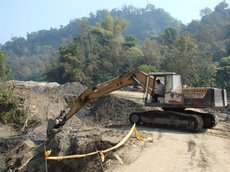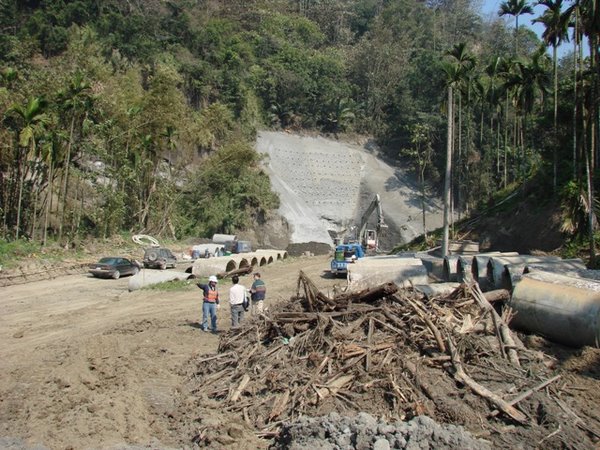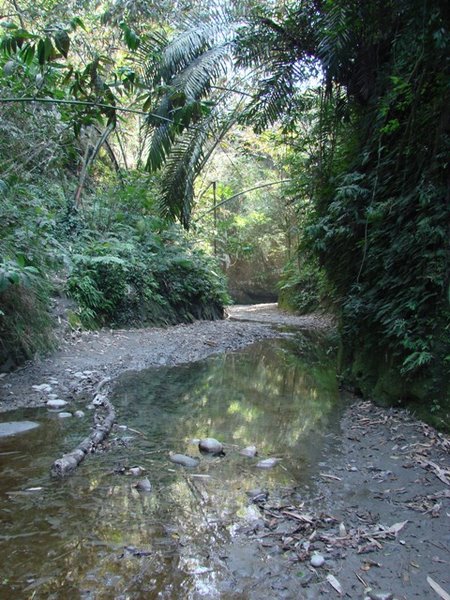
In response to Sunday night's fire at the Formosa Plastics Group plant in Mailiao in Yunlin County the opposition Democratic Progressive Party (DPP) said on Wednesday that it would not likely support further expansion for the petrochemical industry if it were re-elected in 2012 because of health and environmental concerns. We welcome this apparent change of heart on the DPP's position on the expansion of the petrochemical industry. However, the DPP needs to demonstrate commitment to such a position to show that their commitment is real. Words alone are meaningless and nothing but opportune criticism of the ruling KMT regime. Yesterday, Yunlin County Commissioner Su Chih-feng, a member of the opposition DPP, joined a group of Mailiao Township residents protesting outside the Executive Yuan. The question is what is Su going to do today? Joining protests without action is nothing but politicking.
We remember well the then-DPP administration in 2005 pushing for the construction of a planned Naphtha Cracker plant in neighbouring Changhua County. We also remember that Yunlin County Commissioner Su never got behind efforts to stop the Hushan Dam project, a project largely to ensure the water needs of the planned expansion of the petrochemical industry on the west coast.
The DPP's origins go back to the environmental movement of the mid 1980s when Taiwan was under the one-party-dictatorship of the Chinese National Party (KMT). The KMT had enacted Marshal Law in the late 1940s and this period of state-sanctioned terror was only "lifted" in the late 1980s. Because of the DPPs environmental roots the DPP and its allies have been known as the Greens or Green Camp; something many who have concerns for the Taiwan environment find distasteful considering how quickly the DPP abandoned their environmental beliefs when they got into power in 2000. Let's hope that the DPP has had a genuine change of heart and have returned to their original core beliefs.
The KMT also seems to be attempting some form of damage control. A KMT Legislator has proposed amending the Act Governing the Allocation of Government Revenues and Expenditures to make polluting enterprises give 20 percent of their income tax and 30 percent of their commodity tax directly to cities and counties where their factories are located. The KMT has stopped well short of any attempt to rein in the petrochemical industry and still seems determined to ensure the planned expansion of the industry succeeds. Their draconian forced seizure of property to make way for planned industrial expansion moved up a level. This time it wasn't farmers but unwanted trees and elderly residents who were 'cleared' to make way for the Taipei International Flora Expo.
For more, see the following Taipei Times articles:
DPP turns on petrochemicals
Formosa may need two weeks to restart
Dead fish thrown at Executive Yuan
Also see:
Government quick to defend Formosa Plastics in the wake of a second fire
Formosa Plastics on fire again
Friday, July 30, 2010
Opposition pressures Government in wake of the second Formosa fire
Posted by
Wild at Heart Legal Defense Association
at
2:55 PM
0
comments
![]()
Wednesday, July 28, 2010
Farm seizures: Siangsiliao farmers fight to save their community
Farm seizures by the government to clear the land for planned industrial expansion are once again in the news. This time it's not the farmers of Dapu in Miaoli County in northwest Taiwan but the farmers of Siangsiliao village in Erlin Township in west-central Taiwan that are being driven off the land to make way for the highly controversial Central Taiwan Science Park expansion at Erlin. See Siangsiliao farmers fight to save their community in today's Taipei times.
Also see: Dapu farmland seizures
Posted by
Wild at Heart Legal Defense Association
at
11:10 AM
0
comments
![]()
Monday, July 26, 2010
Dapu farmland seizures
The Dapu farmland seizures that have featured prominently in the news for the past fortnight once again highlight the government's apparent crusade to ensure their corporate pals get whatever they desire and to hell with anyone or thing that stands in the way.
The seizure of farmland and private land is nothing new in Taiwan. It was done for the Hushan Dam project and they're doing it for the Central Science Park. Often, even if they don't actually seize the land, farms in close proximity to industrial developments fall victim to pollution contaminating fields and turning once productive agricultural land into toxic weed beds.
The seizure of farmland destroys rural communities. Their way of life perishes. Apart from the destruction of rural communities and the social problems this brings as members of agricultural communities are forced to find a new way of life in an urban environment where their skills are not valued or seen as useful; we should also be questioning the wisdom of reducing the nation's agricultural output in a period when food security should be a major concern of the government. With the impact that global warming will have on international food production and with China squeezing Taiwan out of the international arena at every opportunity, should we really be seizing farmland to build industrial complexes that will increase Taiwan's carbon footprint and offer only unsustainable short-term economic benefit usually to only a select few?
What follows is a list of several articles that have appeared in the media concerning the issue of the seizure of farmland for so-called industrial development.
Now is the right time for major land reform
EDITORIAL : Taiwan lacks food security strategy
Land seizure comes under fire
Wu offers Dapu farmers new farmland
Rice fields outside the Presidential Office
Government must stop seizing our farmland
Farmers fail to meet president
Also see:
Farm seizures: Siangsiliao farmers fight to save their community
Posted by
Wild at Heart Legal Defense Association
at
12:03 PM
0
comments
![]()
Friday, July 23, 2010
Hushan Dam to be completed in 2014

Today's Taipei Times tells us that Hushan Reservoir will be completed in 2014. According to the brief article that appears in today's Taipei Times "the construction of the Hushan Reservoir in Yunlin County is scheduled to be completed in 2014 after environmental issues have been resolved." The article goes on to state that, "The reservoir, designed for joint operation with the Jiji Diversion Weir on Jhuoshuei River, will be able to supply 694,000 tonnes of water per day for public, industrial and household use in the Yunlin region,... The project will improve the quantity and quality of domestic water supply in the region,... At present, residents of the area rely heavily on groundwater, it said, adding that the Hushan reservoir project would help prevent land subsidence resulting from groundwater extraction."
At face value it sounds as if the Hushan Reservoir project is the solution to Yunlin County's water problems. However, a very different picture emerges when you take a closer look.
A major cause of the need for residents of the area to have to rely so heavily on the pumping groundwater that ultimately leads to land subsidence problems is because of the over exploitation of the county's water resources by heavy industry. Supposedly, the Hushan Reservoir will correct this. However, when questions are asked as to how much of the project's water is to be allocated to domestic usage and how much is being allocated to industrial usage it soon becomes apparent that Hushan isn't quite what the authorities want you to believe. Figures exceeding even 80% for industrial usage become apparent. And this water isn't to alleviate the current problem but rather to meet the water needs of planned expansion of heavy pollution- generating industry. Industry that will drastically increase Taiwan's carbon emissions at a time when we should be reducing them. The highly controversial Kuokuang Petrochemical Park development alone will result in at least a 7% increase in Taiwan's carbon emissions not to mention the pollution problems it will cause and the destruction of critically important habitat for the critically endangered Taiwan pink dolphins.
In October 2007, despite previous assurances by the Yunlin County based Formosa Plastics Group that they would keep their water usage to a level not exceeding 257,000 tonnes/day, the applied to increase it to 351,000 tonnes/day. When Formosa Plastics committed to 257,000 tonnes/day this commitment was backed by a pledge from the chairman of Formosa Plastics who said they would shut down operations to the extent necessary to meet their commitment to keep water use down. (see More water for Formosa means less for Taiwan) In 2009 the Formosa Plastics Group was awarded the infamous Black Planet Award for its horrendous global environmental track record.
The construction of Hushan Dam has destroyed much of the most important breeding area for the globally threatened Fairy Pitta. The Fairy Pitta wasn't even mentioned in the original environmental impact assessment. The green light for the project was given under extremely dubious legality in 2007 when the Environmental Protection Administration minister told developers that the decision by the EPA's own environmental impact assessment commission was non-binding. The EIA commission had found that work on the project was illegal and should immediately be halted. The legality of the Hushan Reservoir Project still remains before the courts.
The article concludes saying that the Water Resources agency said it had assembled a team of conservationists that, together with Council of Agriculture officials, would conduct studies on forest and river ecology systems in the areas near the reservoir..." and that the agency "would focus on plant and animal conservation, the creation of new habitats and raising environmental awareness."
Again this sounds good but how are we to trust an agency that omitted to even mention the globally threatened Fairy Pitta in its original assessment? The Hushan project has been anything but transparent. What assurances are there of independent study? Many so called "independent" environmental groups in Taiwan are largely headed by academics and others employed by state-owned institutions and organisations. Such people are unlikely to challenge the the state because of fear of jeopardizing their careers within state-run organisations. Many so called NGOs are dependant on state funds or handouts from the very corporations they should be "confronting." (see The 2007 International Symposium for the Fairy Pitta)
Just how will the Hushan Dam Project be perceived by future generations that inherit the problems resulting from run-away heavy industrial development on Taiwan's west coast. Will it stand as a shining example of development? Or will it stand as an everlasting example of the failure of the Taiwan Environmental Protection Administration to fulfil its mandate which resulted in horrendous environmental destruction and horrific pollution problems? Will Hushan's epitaph be glorious or will it be the extinction of the Taiwan pink dolphins and other species like the Fairy Pitta? Will it be even higher cancer rates in an area that is already seven times the national average? Will the long term health costs and toxic landscape justify the short term financial gains for a few elite business executes? With all the mess we're leaving for our youth and just the next generation, I think the authors of Hushan, Kuokuang and all those other greedy projects will be remembered right up there in a category amongst slave traders and all the other scum of humanity's greedy past.
Posted by
Wild at Heart Legal Defense Association
at
9:50 AM
0
comments
![]()
Monday, July 19, 2010
Corruption in high places: High Court judges and prosecutor held on graft charges
Three High Court judges and a prosecutor held on graft charges ! Former Chinese Nationalist Party (KMT) legislator and Miaoli County commissioner Ho Chi-hui on the run. This scandal has dominated the news for the past week. (see Three judges, prosecutor held on graft charges; Ma accepts Lai In-jaw's resignation)
This most recent scandal followed close on the heels of the assassination of gang boss Weng Chi-nan while some of Taichung's top cops were chilling out in the gangster's office during the shooting and failed to do anything. In the words of Taichung City Police Department Commissioner Hu Mu-yuan "The officers were allegedly connected to gang members and ignored the crime that took place in their presence." As the story continued to break it became clear that Taichung's cops were a regular feature at Weng's office. (see Police sanctioned after man dies in shower of bullets)
One also can't help but remember the dubious legal proceedings in former Taiwan President Chen Shui-bian's corruption case and how current Taiwan President Ma Ying-jeou came out of his mess spotlessly clean when he was charged with corruption in 2007 shortly before he successfully ran as the KMT candidate for the presidency in the 2008 elections. You see it was all his accountant's doing. He put the money into Ma's bank account. (See Unveiling the real Ma Ying-jeou; A Visit with Former President Chen Shui-bian Raises Questions on Taiwan's Double Standard of Justice; Taiwan: As the World Turns Greased With Corruption)
Corruption in high places is nothing new in Taiwan. It has a shamefully long history. One can't help but be suspicious of the judiciary. One can't help but wonder if there are such things as a fair trial, justice, due process and transparency in Taiwan? Dubious decisions in the cases of the Songshan Tobacco Factory, Hushan Dam and the Kuokuang Petrochemical Park Development remain just that; dubious! One can't help but wonder if Mother Earth, the Taiwan pink dolphins and Hushan's Fairy Pittas could get a fair hearing in Taiwan, can you?
(See Disregard for the legal process:- The last of the great Songshan camphor trees; A First for Taiwan: Supreme Administrative Court Upholds Decision to Void Central Science Park EIA – Farmers, Lawyers & Social Groups Petition )
Posted by
Wild at Heart Legal Defense Association
at
3:29 PM
0
comments
![]()







